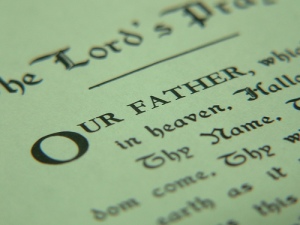Week- Two-The Gospel of Matthew
Chapter Six–Background and Questions for Understanding The Text
We continue Jesus contrast of the letter of the Law taught by the Pharisees that focused on externals and the spirit of the Law which focused on the heart or motivation for our obedience. the Voice begins chapter 6 with this rendering of the text that makes this transition: “Part of imitating the perfection of God is …” Here we have a better sense of what it means to be perfect as our heavenly Father is perfect. It is our desire to live lives that mirror what Christ is like. We ask ourselves “what would Jesus do?” and then do it because we want people to see our lives and learn about Jesus.
1. What two religious acts are described here? How are we to engage in them (clearly the implication is that these are good and godly things to do when they are done rightly)?
2. What is the difference between engaging in these acts to be seen by men and to do these acts only being concerned that God sees them?
There were two basic obligations placed upon the Jews in Jesus’ day: to pray and to give to the poor. Jesus is not nullifying these obligations, but he is challenging people to do them for an Audience of One.
3. Clearly the disciples would think, “then how do I pray?” Beginning in verse 9, Jesus tells them to simply pray along a model that concentrates on communicating with God and submitting yourself to his will. What are the six petitions found in this prayer?
4. Names were given in Jesus day in hopes that a person would live a life that reflected its meaning. Jesus means “he shall save his people” and more than one boy born in Palestine had been given that name in hopes that he would grow up to be the Messiah. Names were considered a reflection of the character of the person who possessed the name. What is the characteristic that Jesus says we ask be associated with God’s name?
5. How is God’s will carried out in heaven? How is it carried out on earth?
6. Verse 11 has its roots in the experience of Israel wandering in the desert, where God gave them manna to eat. God was providing for the basics of their lives–but manna never lasted more than day nor did it need to. The next day God would provide manna again. With this in mind, what do you think Jesus means by this verse?
7. The fourth petition has to do with forgiveness. What does it mean to cancel a debt? Who pays the price when a debt is canceled? Why is this the standard by which we ask God to determine our forgiveness?
8. The fifth petition has to do with temptation. Is this saying that God is the cause for our being tempted?
9. Petition six again speaks of the kingdom of God. What are we asking to do true?


God wants us to pray and love our neighbors as ourselves. HE knows our hearts! If we pray and give to others only for recognition, then our hearts are not where God wants them to be. On the outside it may appear our hearts are in the right place because people cannot “see” our heart – only God can.
Gail Emerich - April 26, 2010 at 8:38 pm |